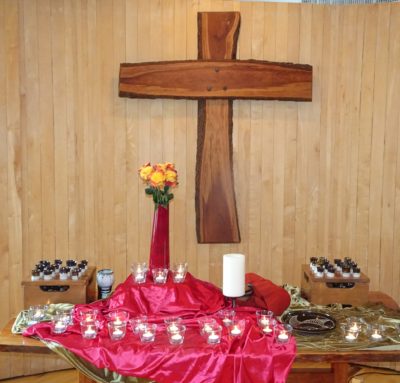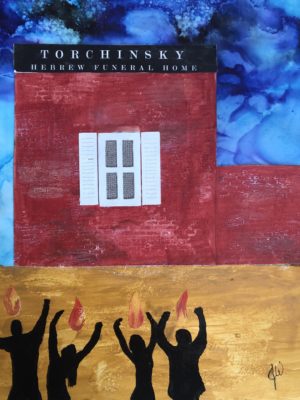 June 9, 2019
June 9, 2019
Pentecost
I love Pentecost, though I’m not the type to speak in tongues and I hope it never happens to me. I imagine other Seekers would be tolerant but somewhat baffled if I did. Still, the idea of the Holy Spirit coming down in tongues of flame is exciting to me. The image of a bunch of Jesus’ followers speaking in many different languages but all understanding each other is inspiring. It’s how I would like the world to be, not just for Christians but for everyone.
 I painted this picture to help me imagine what it would be like if Pentecost happened to us at Seekers. I know Jesus’ followers were actually in the street in the Bible story of Pentecost. but I like to imagine them in the upper room where they were known to hang out. The picture shows the view from the driveway-side windows of Seekers, if the shadows of dancing Seekers with flames resting on their heads were cast onto the wall of the Electric Maid building next door. The next building over after that is Torchinsky Hebrew Funeral Home. Does anyone remember the sermon Deborah gave several years ago in which she said that she likes to read it: Torch in sky? Very fitting for Pentecost,, when tongues of flame are actually dropping from the sky.
I painted this picture to help me imagine what it would be like if Pentecost happened to us at Seekers. I know Jesus’ followers were actually in the street in the Bible story of Pentecost. but I like to imagine them in the upper room where they were known to hang out. The picture shows the view from the driveway-side windows of Seekers, if the shadows of dancing Seekers with flames resting on their heads were cast onto the wall of the Electric Maid building next door. The next building over after that is Torchinsky Hebrew Funeral Home. Does anyone remember the sermon Deborah gave several years ago in which she said that she likes to read it: Torch in sky? Very fitting for Pentecost,, when tongues of flame are actually dropping from the sky.
I wrote a poem to go with the picture. In the poem, I imagine that I was actually there on Pentecost. The poem, like my sermon, is titled “That Holy Room. Some of you have heard this poem before but I’ll read it again now:
I’ll always remember the day
God’s spirit fell as tongues of flame
that rested on our heads but didn’t burn.
A powerful unity swept through the room,
The Holy Spirit was in us. We wanted to tell the world.
We danced, even our arms
danced high and waving here and there.
I heard strange languages (and spoke one myself)
but I understood each one.
In every language we were praising God.
Some of us talked, some sang, others shouted
People in the street outside shouted too:
“Shut up you drunks!”
But we were too drunk on God to stop.
It didn’t last, of course, we sobered up,
but part of me is still in that holy room,
beside ourselves crazy with joy.
Here are some of the many things I like about the Pentecost story:
- Jesus has risen
- The Holy Spirit is in the room and in Jesus’ followers
- God’s Spirit makes them joyful
- They are expressing themselves
- They speak diverse languages
- They understand each other
- They have a sense of unity, or community
- They will go out and spread their joy to others
It is not surprising that the people outside the room thought that Jesus’ followers were drunk. It was the Swiss psychologist Carl Jung who first pointed out the connection between “Spirit” and “spirits,” or alcohol, in a letter to Bill Wilson, the founder of Alcoholics Anonymous. Jung argued that drinking alcohol provides a low-level spiritual experience and that the alcoholic’s thirst for alcohol is really a thirst for God. He felt that the only freedom from alcoholism lay in the substitution of spirituality for alcohol.
When Jung talked about spirituality he was not talking about membership in a religious group or belief in a particular creed or dogma. He focused more on the mystical tradition that has a place in all of the main religions of the world. According to Margaret Clark, of the Society of Analytical Psychology, “The emphasis in this tradition is on…a direct experience of being with God, or being a part of God, or a vehicle through which God’s grace can be communicated to others. … There is always an acknowledgment of how much the (person) does not and cannot know of God, an appropriate humility before the unknown and the unknowable.” https://www.thesap.org.uk/resources/articles-on-jungian-psychology-2/about-analysis-and-therapy/spirituality-and-religion/ She notes that over the door at his house in Zurich, Jung had inscribed: Whether summoned or not, God will be present. Jung felt that spiritual needs were just as real as hunger, or thirst and other survival needs..
Eugene Gendlin, the author of the book Focusing, defines spirituality as: “a subtle, bodily feeling with vague meanings that brings new, clearer meanings involving a transcendent growth process.”
Another definition, the origin of which I was not able to trace, is: “A heightened awareness of life that surpasses the ordinary experience of life and that may challenge ordinary interpretations of life.”
Some of the concepts that often occur in descriptions of spiritual experiences are listed in a Psychology Today article. They include:
- The experience of a different reality
- Awareness of a patterning of events (Jung called it synchronicity)
- Awareness of a presence (God or something else—a higher power or perhaps a sacred presence in nature)
- Awareness of prayer being answered
- Awareness that all things are one
- Awareness of the presence of the dead
However you define it, there is no doubt that Jesus’ followers were having a spiritual experience in that holy room (or on that holy street, depending on where you imagine that Pentecost occurred).
Did you ever have a wonderful feeling, a helpful insight, or some good news that you really wanted to share? Those experiences are probably just a glimmer of what they felt in that room on that special day. Before, Jesus had been the teacher and healer; now they were going to go out and be the teachers and healers themselves.
I like the fact that the lectionary readings for today include the story of the Tower of Babel. It makes a rich contrast to the Pentecost story.
The Tower of Babel story tells a tale from long before Pentecost. In those times, all of earth’s people were one and they all spoke the same language. God’s plan was to scatter the people so that they would populate the whole earth, but the people had a different plan. They decided to defy God and built a tall and mighty tower to make a name for themselves and to avoid being scattered. By building the tower they presumed to ascend to heaven and attain a god-like power. God reacted by saying: “Come, let us go down, and confuse their language there, so that they will not understand one another’s speech.” (Who was us, anyway?) Then he destroyed the tower and scattered the people over the face of the earth. It was the old “divide and conquer” strategy.
To me the tower of Babel story is about humility. Knowing our own place in the order of things an aspect of spirituality. We are not God. We are here to do God’s will, not our own, Just as Jesus’ followers were there in that holy room to be inspired to do God’s will by spreading the Word. I’m not a Word-spreader in the sense of preaching the gospel to hapless bystanders. In all honesty, I take the Bible metaphorically rather than literally, but my spirituality does provide me with joy and peace of mind. I believe we can spread joy and peace of mind to others just by having a joyful and peaceful heart ourselves.. I love to support others in their own spiritual journeys and I am quite broadminded about what those spiritual journeys might be.
The Tower of Babel story is different from the Pentecost story because people are being divided, not united. Also, God’s will for them is for them to scatter and populate the earth. In the Pentecost story, the earth is already populated with people speaking many different languages and God’s will for Jesus’ followers seems to be that they unite the world’s people into a community in which all are valued and understood.
Another big difference between the two stories is that in the Tower of Babel story, God lives “up there” while the rest of us live “down here.” In the Pentecost story, the tongues of flame represent the Holy Spirit and the people in the room are actually filled with the Holy Spirit. God is in them, not off in some separate realm above. The Holy Spirit of God is here on earth. Jesus’ followers will carry the Holy Spirit inside them when they leave. They will be a part of the “body of Christ” here on earth. In Seekers we often refer to ourselves as the body of Christ. I want to close by reading a poem by Teresa of Avila, a 16th century Carmelite nun. The poem is entitled, “Christ Has No Body.”
Christ has no body but yours,
No hands, no feet on earth but yours,
Yours are the eyes with which he looks with
Compassion on this world,
Yours are the feet with which he walks to do good,
Yours are the hands, with which he blesses all the world.
Yours are the hands, yours are the feet,
Yours are the eyes, you are his body.
Christ has no body now but yours,
No hands, no feet on earth but yours,
Yours are the eyes with which he looks with
compassion on this world.
Christ has no body now on earth but yours.
I suggest we leave here today as the body of Christ, filled with the Holy Spirit, doing our best to understand all languages, and letting God’s love shine through us.